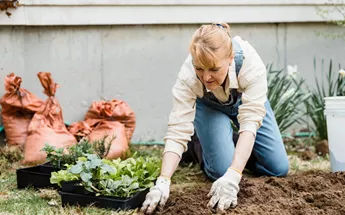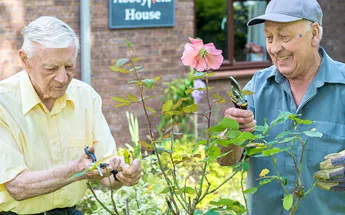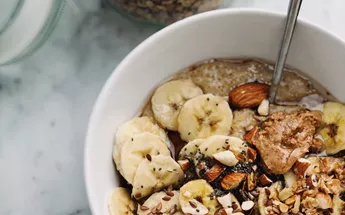As we age, maintaining a nutritious diet becomes increasingly important for our overall health and wellbeing. One way to ensure a consistent supply of fresh, nutrient-rich produce is by growing your own vegetables.
Gardening is a wonderful hobby that offers numerous benefits for people of all ages. For older people, it not only provides physical activity and mental stimulation, but growing your own vegetables also offers a host of nutritional benefits, particularly for older adults.
How to start growing your own vegetables
There's nothing better than enjoying the fruits of your labour, that you get from growing your own vegetables. Growing your own vegetables can leave you a with feeling of satisfaction and joy, knowing all the effort and work you've put in has produced something you can enjoy.
When starting to grow your own vegetables, it can seem overwhelming knowing where to start, so we've put together some tips.
Choose the right vegetables for your garden
Picking the right vegetables for your garden is important, you should consider the space that you have available, the location in your garden and any personal preferences you have, such as deciding on vegetables that you like to eat and any dietary needs you have.
Growing your own vegetables is more enjoyable when you are rewarded with foods you like. For example, if you love eating salads, vegetables like lettuces, tomatoes, cucumbers would be a good place to start.
Planning your garden
Spend some time planning your garden layout will help you ensure you make the most of your space. You should look at the sunlight patterns to ensure your vegetables will receive adequate light, as well as considering companion planting, which involves planting certain crops together to optimise their growth and deter pests. For example, peas pair well with beans, carrots, corn or cucumbers, but don't do well with onions or garlic. Learn more about which vegetables grow well together.
Preparing your soil
Ensuring you have a nutrient-rich soil environment is essential for healthy plant growth. Make sure you clear away any debris, weeds, or rocks, and you can also enrich the soil by including compost or well-rotted manure. This will help to ensure that the soil has essential nutrients, as well as enhancing water retention, and promoting good plant development.
Sowing your seeds and planting
You can decide to start with either seeds or young plants. You'll usually find instructions on the seed packet and plant labels which will tell you how much space the plant needs and how far down you should plant it.
Watering your plants
Watering is an important aspect of plant care. Make sure you check the moisture levels of your plants and make sure water them regularly.
Maintenance and pest control
Regularly maintaining your garden is the key to making sure it thrives. Check your plants for signs of pests or disease, remove weeds to prevent competition for nutrients and space, and harvest your vegetables to encourage further production.
Enjoy your harvest
As your plants and vegetables start to mature, enjoy harvesting your vegetables at the peak of their flavour.
Starting to grow your own vegetables and gardening has a wealth of benefits for older people, as the act of growing your own vegetables not only increases physical activity, but also provides you with fresh produce, whilst developing a sense of purpose and fulfillment.

The benefits of growing your own vegetables
Increased physical activity
Growing your own vegetables requires physical activity, such as planting, watering, weeding and harvesting. These activities encourage low impact exercise, which can improve flexibility, strength, and overall physical wellbeing.
Access to fresh and nutritious food
Growing your own vegetables ensures that you have a supply of fresh produce. You can have control over what you grow, opting for nutrient dense vegetables, fruits or herbs that can be tailored to specific dietary needs. Freshly harvested vegetables are rich in vitamins, minerals and antioxidants which all contribute to better health.
Sense of purpose and fulfilment
Gardening and tending to plants can provide a sense of purpose and fulfilment for older people. Seeing the efforts bear fruit, quite literally, can be immensely satisfying. Being outdoors offers a chance to connect with nature, fostering a sense of calmness and well-being.
Cost savings
Growing your own vegetables can lead to cost savings on your food bills, especially if the produce is expensive. It can also be a cost-effective way to access organic or specialty vegetables that can be difficult to find.
Environmental sustainability
By reducing the reliance on commercially grown produce, you can reduce your carbon footprint, whilst also decreasing the use of harmful pesticides and need for transportation.
Read more on gardening and nutrition for older people
A beginners guide to gardening
Whether you have a small balcony or a large space, gardening can be a relaxing and rewarding hobby. It is the perfect way to connect with nature and truly reap what you sow.
The health and wellbeing benefits of gardening
From helping to reduce stress to perhaps even being the secret to a longer life, we take a look at some of the many health and wellbeing benefits of gardening.
Creating a healthy and balanced diet
Ensuring that you eat a healthy and balanced diet is good for you and you should always try to eat a wide variety of foods to get enough essential vitamins and minerals. We’ve listed some ideas for ways to help you eat well and develop a nutritious diet for yourself.


